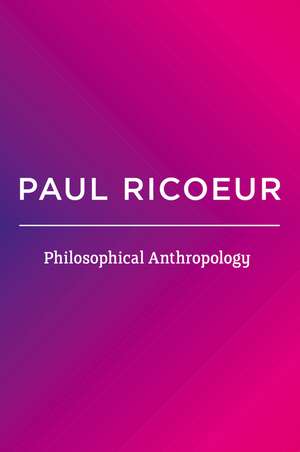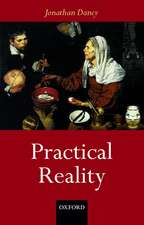Philosophical Anthropology
Autor P Ricoeuren Limba Engleză Paperback – 17 dec 2015
This appeal to a specifically philosophical approach to questions regarding what it was to be human did not stop Ricoeur from entering into dialogue with other disciplines and approaches, such as psychoanalysis, history, sociology, anthropology, linguistics and the philosophy of language, in order to offer an up-to-date reflection on what he saw as the fundamental issues. For there is clearly not a simple, single answer to the question what is it to be human? Ricoeur therefore takes up the complexity of this question in terms of the tensions he sees between the voluntary and the involuntary, acting and suffering, autonomy and vulnerability, capacity and fragility, and identity and otherness.
The texts brought together in this volume provide an overall view of the development of Ricoeurs philosophical thinking on the question of what it is to be human, from his early 1939 lecture on Attention to his remarks on receiving the Kluge Prize in 2004, a few months before his death.
Preț: 239.99 lei
Nou
Puncte Express: 360
Preț estimativ în valută:
45.93€ • 49.87$ • 38.58£
45.93€ • 49.87$ • 38.58£
Carte tipărită la comandă
Livrare economică 22 aprilie-06 mai
Preluare comenzi: 021 569.72.76
Specificații
ISBN-13: 9780745688541
ISBN-10: 0745688543
Pagini: 304
Dimensiuni: 151 x 228 x 18 mm
Greutate: 0.5 kg
Editura: Polity Press
Locul publicării:Chichester, United Kingdom
ISBN-10: 0745688543
Pagini: 304
Dimensiuni: 151 x 228 x 18 mm
Greutate: 0.5 kg
Editura: Polity Press
Locul publicării:Chichester, United Kingdom
Public țintă
Students and scholars of continental philosophy, literary theory, cultural theory, theology and psychoanalysisNotă biografică
Paul Ricoeur is (1913-2005) is widely recognized as one of the most distinguished philosophers of the twentieth century. He taught for many years at the University of Chicago. His many works include Freud and Philosophy, Time and Narrative and Oneself as Another.
Descriere
How do human beings become human? This question lies behind the so-called human sciences. But these disciplines are scattered among many different departments and hold up a cracked mirror to humankind.














